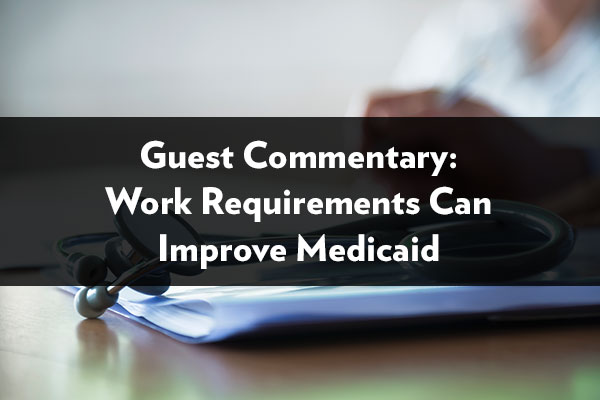Commentary

Medicaid is Broken, Work Requirements Can Help
Guest Commenatry from Rep. Matthew Dowling
Pennsylvanians deserve every opportunity to live fulfilling, prosperous lives. But too often, government programs end up holding back our friends and neighbors by discouraging them from pursuing independence. That’s why the state House recently passed legislation to promote work—a tried and true solution to poverty—among healthy, able-bodied Medicaid recipients.
House Bill 2138, which I introduced, would add Medicaid to the list of human service programs, like cash assistance and food stamps, which already have some form of work requirement. Under my bill, healthy adults on Medicaid, who do not fall under a list of exemptions, would have to find part-time work or pursue job training to continue receiving Medicaid benefits.
Medicaid, a state-administered health insurance program, was originally designed to serve children and individuals with disabilities. The program was intended to serve the most vulnerable in our society: the blind, intellectually disable, low-income children, and other vulnerable populations. That all changed with the Affordable Care Act.
For the first time, states could enroll low-income, healthy adults. As a result, Medicaid enrollment has exploded in Pennsylvania with almost 800,000 healthy adults joining the program since 2015. But Medicaid was never designed to help healthy people regain independence and was, even before the Affordable Care Act, an inefficient provider of low-quality care.
Today, one in four Pennsylvanians depend on Medicaid for health insurance. This rapid growth is a concerning trend for any welfare program. As President Ronald Regan once said, “We should measure welfare’s success by how many people leave welfare, not by how many are added.”
Even more concerning, resources are being diverted from those who need them most to accommodate the influx of healthy adults. In fact, a recent study from the Foundation for Government Accountability finds 9,728 Pennsylvanians are waiting for home-based health care. Even worse, an estimated 154 individuals have passed away on the waiting list since states began expanding Medicaid.
State and local taxpayers provide more resources to the healthy, low-income Medicaid population than to families in severe poverty. The healthy population costing roughly $7,895 per capita, compared to $4,500 per capita for the most needy. Overall, Medicaid spending is growing at an unsustainable rate of 5.7 percent per year—nearly triple the state’s 2 percent economic growth.
While Medicaid guarantees coverage, it does not ensure quality care. For example, Medicaid recipients have more difficulty finding doctors and longer wait times than those with private insurance—thanks to low provider reimbursements and a maze of red tape.
To be clear, the many shortcomings of Medicaid are not the fault of enrollees. Indeed, many Medicaid recipients are working and preparing to leave the program’s rolls. But half of healthy adults are not. That’s a problem because we know the best pathway out of poverty is work.
That’s not a theory. We know broad work requirements for healthy adults raise incomes. When individuals receiving food stamps in Kansas and Maine were required to work or volunteer part time, the incomes for half of those who left the program doubled within a year. Returning to work improved their lives.
My legislation, now under consideration by the state Senate, instructs the Department of Human Services to seek federal permission to institute commonsense work requirements for healthy adults without young children at home.
It is important to note this is a part-time work requirement of 20 hours per week and job training can be used to meet the requirement. This requirement would not apply to the disabled, addicted individuals, pregnant mothers, or new mothers. It also makes exemptions for adults that are the primary caregiver of a disabled family member.
Eleven states have attempted to institute Medicaid work requirements and three have been approved so far. Pennsylvania should be the next state to utilize work as a permanent pathway out of poverty for healthy adults on Medicaid.
I believe everyone has something to contribute to their community. By encouraging self-sufficiency, we can help more Pennsylvanians find careers and live happier lives, while preserving resources for those most in need.
Editor's Note: Rep. Matthew Dowling is a first term lawmaker serving the 51st district containing Fayette and Somerset Counties. He serves on the Children and Youth, Urban Affairs, Gaming Oversight, and Local Government Committees.